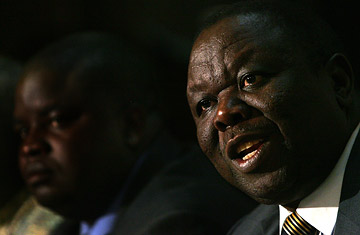
Morgan Tsvangirai
(2 of 2)
It seems most Zimbabweans are very fearful right now, but some seem to be talking about a full-on insurrection.
Look, those are just speculations. The people have no capacity to resist an armed dictatorship, and the dictatorship is not yet ready to negotiate. So I think the only thing with such a stalemate is that the people will prevail. That's the only thing.
How will they prevail?
By continuing to resist the regime ... By making sure that the international community isolates it, by making sure the economy is not sustainable. That way, the regime's pillars of support will realize how futile it is to continue.
One of the generals' biggest qualms about an end to the rule of Mugabe's Zanu-PF is said to be the fears of facing prosecution for the Matabeleland massacres of the 1980s [when Mugabe's government waged an anti-insurgency campaign that led to widespread starvation, thousands of deaths and other atrocities in the homeland of the Ndebele minority]. Would you ever consider an amnesty?
The point is that it's the fear of the unknown. It's the insecurity around these people. But we have never used that as a campaign strategy, to say, "Let's engage in retribution." The MDC has never said that we're going to engage in a retributive agenda. We had reached a point where we had said, "Let's let bygones be bygones, for the country to move forward." But now, with the current wave of violence that is taking place, I don't know what position one can take because these killings are really being sponsored by the military — the very same people who should have considered not to proceed on this genocide.
By genocide, you're referring to Matabeleland or the situation now?
No, not just Matabeleland. What's taking place now is state-sponsored violence and killings by the military and the militias. It's no different from the janjaweed [who have been accused of genocide in Darfur]. It's no different from Charles Taylor's actions in Liberia, where the militia was responsible for killing, maiming, raping and arson within the rural areas. That's exactly what's happening. Twenty-five thousand people internally displaced, 3,000 people needed hospitalization because of torture, 65 dead, and 200 missing and unaccounted for. So that is a massive scale of deliberate state-sponsored action against unarmed civilians.
These current atrocities, in other words, are one more reason for the generals to be afraid of handing over power ...
There are two reasons, really. One, of course, is the insecurity issue, but the other is really selfish. It's about money, lifestyles they want to protect.
You believe there's an entrenched culture of corruption within Zanu-PF — so that's what they want to hang on to is these opportunities to enrich themselves?
It's the lifestyle, it's the patronage system of Mugabe that has cushioned them from the economic difficulties that everyone else is exposed to.
Say that you do become president of Zimbabwe. What is the way forward? How would you deal with what's happened, and how would you begin to tackle the huge economic and political problems that you would be inheriting?
We have a program. It's really based on five key issues. One is, how do we restore people's freedoms? We really need a new constitution; we need to establish a rule of law. We need to depoliticize the security institutions and national institutions, which have been so militarized and politicized. We need to fix the economy by restoring macroeconomic stability in the country and reconstruction in the country. For that we need international support. We need to restore basic services: schools, hospitals ... We need to restore our productivity of the land. We need to restore Zimbabwe again as part of the family of nations, not as a pariah state. So there is a plan, we have a plan. One does not underestimate the challenges, but that does not mean it cannot be done.
